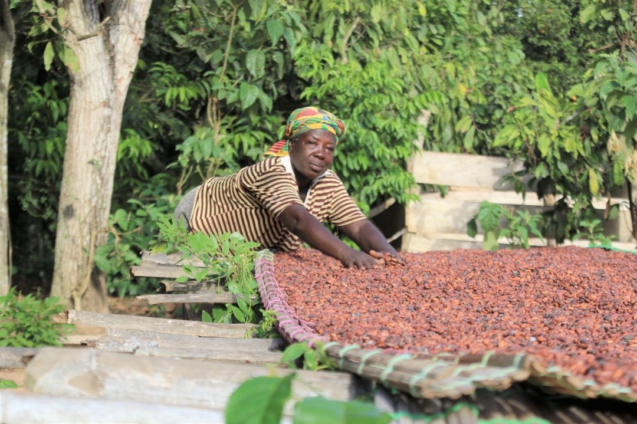In West Africa, particularly in Ghana, deforestation for cocoa production and other agriculture purposes is a concern, as smallholder farmers continue to cut down forests to establish new cocoa plantations and for other farming activities.
In a small village called New Apaso located in the Sekyere East District of Ashanti Region of Ghana live Moses Nkrumah and his wife Ama Konadu, who have been farming cocoa for the past 20 years. The couple currently own 23 acres of cocoa farm. Ama narrates the usual cocoa farming practices.
“I currently have eight acres of cocoa farm and my husband has 15 acres. At first when we cut trees for farming, we were not replanting and most of the cocoa trees don’t do well especially when it gets to the dry season. We were also just using chemicals anyhow for spraying and all these were affecting our yields badly”, stated Ama.
Cocoa, according to research, has proven to produce higher yields under shade trees than when grown in full sun during wet and dry periods. So, farmers are often encouraged to grow shade trees to buffer cocoa plants from heat and water stresses. This is because it is projected that, rising temperatures and increasingly frequent droughts will turn large portions of cocoa-producing regions to savanna by 2050.
To help address the looming cocoa production crisis amidst changing climate, the Ghana Cocoa Board (COCOBOD) and the United Nations Development Programme (UNDP), with funding from the Mondelēz International Cocoa Life Programme, provided direct farmer trainings to over 35,000 farmers (38% females) and about 2,750 extension trainers on sustainable natural resource and ecosystem management practices. This is to prepare the farmers to adopt climate resilient production practices to mitigate the adverse effects of climate change.
The project under the Cocoa Life Programme also supported the farmers to plant over 1 million economic trees on their farms between 2014-2020. The farmers were also taught when to prune the trees and apply organic and inorganic fertilizers to promote healthy growth.
“My yields have doubled from 8 bags to 16 when I harvest from my 8 acre-farm. I might say am financially independent, as I don’t have to be asking my husband for everything. The good news is that, we have all our three children in the University, so am very happy, stated Ama.
The benefits of planting trees in their farms, according to Ama and the husband Moses, are enormous.
“Nowadays, the weather is hot and the trees we planted have been providing us with shades. Otherwise, most of the cocoa trees will have died just like in the past. The Cocoa Life Programme has really helped us, Moses indicated.
Besides buffering cocoa plants, shade trees also enhance soil fertility due to leaf shedding and pruning residues. These enrich the soil in organic matter and recycle nutrients and reduce soil erosion.
The project interventions benefited about 271 communities in 12 Districts across Ghana and facilitated the establishment of two Community Resources Management Areas (CREMAs) in Asunafo North in the Ahafo Region and Wassa East in the Western Region which are empowering over 60 communities to manage and take decisions on natural resource usage within their enclave.
Ghana is the second largest global cocoa producer and cocoa is the main agriculture export product, sustaining the livelihood of more than 800,000 small-scale households across the cocoa growing region of the country.
It is therefore important to continue to support cocoa farmers to adopt environmentally sustainable practices for improved livelihoods and to restore degraded landscapes.
Latest Stories
-
Tens of thousands queue to see Pope Francis’s body
1 hour -
UK edges towards youth visa deal with EU
1 hour -
‘We are committed to assisting Ghana and other countries hit by global tariff war — IMF MD
2 hours -
‘IMF targets will be irrelevant by 2028’ – Bright Simons warns against programme exit
2 hours -
‘Early IMF exit makes for great optics, bad economics’ – Bright Simons warns of premature celebration
2 hours -
‘Ghana’s IMF exit is a political show’ – Bright Simons warns of missed reform opportunity
3 hours -
California passes Japan as fourth largest economy
3 hours -
South Africa and Ukraine woo each other – as relationships with Trump turn sour
3 hours -
Benin admits that 54 soldiers killed in attack by al-Qaeda group
4 hours -
Stress doesn’t just affect your bladder. It can hijack your overall health
4 hours -
ECOWAS must unite against violent extremism – Tinubu
4 hours -
ASFC 2025: ‘I look up to Neymar’ – Ghanaian youngster John Andor
4 hours -
The dilemma of Mohammed Kudus: Prestige in Europe or big money in Saudi Arabia?
5 hours -
ASFC 2025: ‘We didn’t come to play’ – Ghana coach cautions South Africa ahead of semis clash
5 hours -
ASFC 2025: Ghana boys face last year champions Tanzania in semifinals
5 hours

